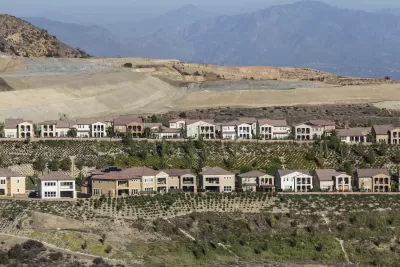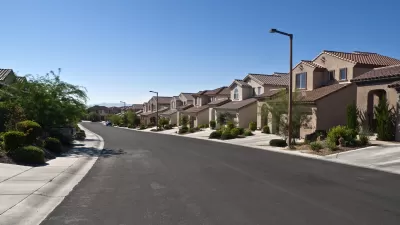The politics of development in California achieved another significant milestone recently, when a YIMBY organization and an environmental advocacy organization collaborated on new land use legislation to be considered by the State Legislature.

California YIMBY and the Nature Conservancy have co-sponsored a bill, AB 68, that would make it harder to build housing in areas prone to fires or flooding and make it easier to build housing in urban areas. The legislation marks a new level of partnership between the pro-development and environmental movements in California.
According to the California YIMBY website, the bill creates new sustainability criteria for greenfield development that would require local governments to demonstrate that greenfield housing development “is necessary to meet local housing needs,” relocating the burdens of the development approval process usually reserved for urban developments. State Assembly Member Chris Ward, the legislator carrying the bill, is quoted in an article by Dustin Gardiner for the San Francisco Chronicle saying the bill would make it ‘very rare or close to impossible’ for exurban development.
California YIMBY noted that the law would also make it easier to develop housing in urban areas by accelerating approvals for new homes in areas already determined to be “climate safe” by Sustainable Communities Strategies and Master Environmental Impact Reports. (Sustainable Communities Strategies are already mandated by the state’s landmark land use legislation, SB 375.)
For years, environmental groups in the state have opposed development in urban areas, wielding the state’s California Environmental Quality Act (CEQA) to block urban developments and prevent reforms intended to mitigate CEQA abuse. Meanwhile, sprawling greenfield development gobbled up agricultural land and natural space on the periphery of the state’s regions, contributing to greenhouse gas emissions and enabling white flight. The state’s urban areas are seeing dire consequences from rising housing costs, including out-migration, displacement, and growing numbers of people experiencing homelessness. Though some environmental groups have discussed the need for a new approach to land use regulation to respond to these crises, the partnership between California YIMBY and the Nature Conservancy is a new level of action.
The news comes on the heals of another clear sign of the shifting politics of development in California—earlier this week, the state supreme court declined to consider a CEQA appeal from opponents of a multi-family development in the East Bay suburb of Lafayette. It’s safe to say we are seeing a tectonic shift in the politics of planning in the nation’s most populous state.
With talking points about ending exurban development likely to be a non-starter for many in the halls of political and financial power in the state of California, the model for partnership between YIMBYs and an environmental advocacy organizations has been established, and we are likely to see new examples of similar efforts, soon.
While some environmental groups have been slowly coming around the urbanism as a sustainable practice, there’s still a long way to go, so there’s lots of room to experiment. For example, California is a one of a relatively small number of states where environmentalists wield this kind of veto power over development decisions, so it would be interesting to see where these kinds of partnerships might find new middle ground where the opposite is true, and development forces hold all the cards. The political math of this kind of partnership might work out in either setting because this partnership represents a new middle ground.

Alabama: Trump Terminates Settlements for Black Communities Harmed By Raw Sewage
Trump deemed the landmark civil rights agreement “illegal DEI and environmental justice policy.”

Study: Maui’s Plan to Convert Vacation Rentals to Long-Term Housing Could Cause Nearly $1 Billion Economic Loss
The plan would reduce visitor accommodation by 25% resulting in 1,900 jobs lost.

Why Should We Subsidize Public Transportation?
Many public transit agencies face financial stress due to rising costs, declining fare revenue, and declining subsidies. Transit advocates must provide a strong business case for increasing public transit funding.

Wind Energy on the Rise Despite Federal Policy Reversal
The Trump administration is revoking federal support for renewable energy, but demand for new projects continues unabated.

Passengers Flock to Caltrain After Electrification
The new electric trains are running faster and more reliably, leading to strong ridership growth on the Bay Area rail system.

Texas Churches Rally Behind ‘Yes in God’s Back Yard’ Legislation
Religious leaders want the state to reduce zoning regulations to streamline leasing church-owned land to housing developers.
Urban Design for Planners 1: Software Tools
This six-course series explores essential urban design concepts using open source software and equips planners with the tools they need to participate fully in the urban design process.
Planning for Universal Design
Learn the tools for implementing Universal Design in planning regulations.
Caltrans
Smith Gee Studio
Institute for Housing and Urban Development Studies (IHS)
City of Grandview
Harvard GSD Executive Education
Toledo-Lucas County Plan Commissions
Salt Lake City
NYU Wagner Graduate School of Public Service






























